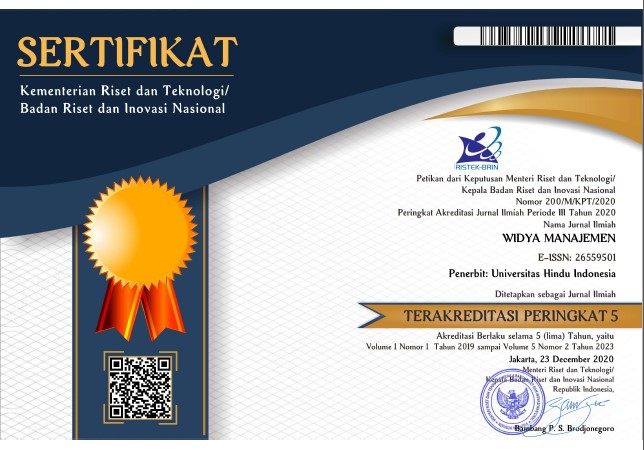Pengaruh Emotional Demand, Emotional Exhaustion, dan Abusive Supervision terhadap Turnover Intention
Abstract
The purpose of this study is to analyze the influence of emotional demand, emotional exhaustion, and abusive supervision on turnover intention. In this study, primary data was collected using a questionnaire on a google form filled out by Trisakti University students who were already working. The data collection method uses the purposive sampling method with a sample of 165 samples. The data processing techniques used in this study were testing instruments such as validity and reliability tests and Structural Equation Modeling (SEM) using SPSS version 25 and AMOS version 24. The results of this study revealed that emotional demand has a significant influence on turnover intention, emotional exhaustion has a significant influence on turnover intention, and abusive supervision has a significant influence on turnover intention.
References
Ahmed, Z., Sabir, S., Khosa, M., Ahmad, I., & Bilal, M. A. (2016). Impact of Employee Turnover on Organisational Effectiveness in Tele Communication Sector of Pakistan. IOSR Journal of Business and Management Ver. IV, 18(11), 88–96. https://doi.org/10.9790/487X-181104128136
Azharudeen, N. T., & Arulrajah, A. (2021). The Mediating Effect of Emotional Exhaustion in the Relationship Between Emotional Demand and Turnover Intention. The IUP Journal of Management Research, 20(2), 53–69.
Azharudeen, N. T., & Arulrajah, A. A. (2018). The Relationships among Emotional Demand, Job Demand, Emotional Exhaustion and Turnover Intention. International Business Research, 11(11), 8–18. https://doi.org/10.5539/ibr.v11n11p8
Bai, P., Suresh, S., Ansari, J., & Ahmed, S. (2022). Why Employees are not loyal to their Workplace in Private Sector? Global Management Journal for Academic & Corporate Studies, 12(1), 82–98. https://www.proquest.com/scholarly-journals/why-employees-are-not-loyal-their-workplace/docview/2691833511/se-2?accountid=150506%0Ahttps://media.proquest.com/media/hms/PFT/1/oBphN?_a=ChgyMDIyMDgxMTA4MDYzMTk1MDo2ODQ2NjcSBzEyMzk3MzEaCk9ORV9TRUFSQ0giDjIxMC4x
Charzy?ska, E., Polewczyk, I., Gó?d?, J., Kitli?ska-Król, M., & Sitko-Dominik, M. (2021). The buffering effect of spirituality at work on the mediated relationship between job demands and turnover intention among teachers. Religions, 12(9). 1–24. https://doi.org/10.3390/rel12090781
Ducharme, L. J., Knudsen, H. K., & Roman, P. M. (2008). Emotional exhaustion and turnover intention in human service occupations: The protective role of coworker support. Sociological Spectrum, 28(1), 81–104. https://doi.org/10.1080/02732170701675268
Gutmann, P. (2016). Tackling Trends in Turnover. 25. https://www.mercer.com/content/dam/mercer/attachments/global/webcasts/gl-2016-webcast-talent-tackling-trends-in-turnover-mercer.pdf
Ishtiaq Ahmed. (2018). Organizational politics and turnover intention: A study from private colleges of Pakistan. International Journal of Business and Management Review, 6(4), 14–28.
Johannessen, H. A., Tynes, T., & Sterud, T. (2013). Effects of occupational role conflict and emotional demands on subsequent psychological distress: A 3-year follow-up study of the general working population in Norway. Journal of Occupational and Environmental Medicine, 55(6), 605–613. https://doi.org/10.1097/JOM.0b013e3182917899
Keashly, L. (1998). Emotional Abuse in the Workplace: Conceptual and Empirical Issues. Journal of Emotional Abuse, 1(1), 85–117. https://doi.org/10.1300/J135v01n01
Khairunisa, N. A., & Muafi, M. (2022). The effect of workplace well-being and workplace incivility on turnover intention with job embeddedness as a moderating variable. International Journal of Business Ecosystem & Strategy (2687-2293), 4(1), 11–23. https://doi.org/10.36096/ijbes.v4i1.303
Kim, N., Kang, Y. J., Choi, J., & Sohn, Y. W. (2020). The crossover effects of supervisors’ workaholism on subordinates’ turnover intention: The mediating role of two types of job demands and emotional exhaustion. International Journal of Environmental Research and Public Health, 17(21), 1–17. https://doi.org/10.3390/ijerph17217742
Lee, L., & Madera, J. M. (2019). A systematic literature review of emotional labor research from the hospitality and tourism literature. International Journal of Contemporary Hospitality Management, 31(7), 2808–2826. https://doi.org/10.1108/IJCHM-05-2018-0395
Li, J. (Justin), Wong, I. A., & Kim, W. G. (2017). Does mindfulness reduce emotional exhaustion? A multilevel analysis of emotional labor among casino employees. International Journal of Hospitality Management, 64, 21–30. https://doi.org/10.1016/j.ijhm.2017.03.008
Lim, P. K., Koay, K. Y., & Chong, W. Y. (2021). The effects of abusive supervision, emotional exhaustion and organizational commitment on cyberloafing: a moderated-mediation examination. Internet Research, 31(2), 497–518. https://doi.org/10.1108/INTR-03-2020-0165
Liu, S., Zhu, Q., & Wei, F. (2019). How abusive supervision affects employees’ unethical behaviors: A moderated mediation examination of turnover intentions and caring climate. International Journal of Environmental Research and Public Health, 16(21), 1–14. https://doi.org/10.3390/ijerph16214187
Mathieu, C., & Babiak, P. (2016). Corporate psychopathy and abusive supervision: Their influence on employees’ job satisfaction and turnover intentions. Personality and Individual Differences, 91, 102–106. https://doi.org/10.1016/j.paid.2015.12.002
Sekaran, U., & Bougie, R. (2016). Reserach Methods for Bussiness: A Skill-Bulding Approach (7th ed.). John Wiley & Sons Ltd.
Shin, Y., Hur, W. M., Park, K., & Hwang, H. (2020). How managers’ job crafting reduces turnover intention: The mediating roles of role ambiguity and emotional exhaustion. International Journal of Environmental Research and Public Health, 17(11), 1–18. https://doi.org/10.3390/ijerph17113972
Suyono, J., Eliyana, A., & Ratmawati, D. (2020). The nightmare of turnover intention for companies in Indonesia. Opcion, 36(91), 871–888.
Tepper, B. J. (2000). Consequences of abusive supervision. Academy of Management Journal, 43(2), 178–190. https://doi.org/10.2307/1556375
Usmani, S. (2020). Does Higher Emotional Exhaustion Lead To Turnover Intention When Employees Have Perceived External Employability? City University Research Journal, 9(4), 620–634.
Veldstra, C. (2020). Bad feeling at work: emotional labour, precarity, and the affective economy. Cultural Studies, 34(1), 1–24. https://doi.org/10.1080/09502386.2018.1555269
Wanggi, A., Panggabean, M., & Puspa, T. (2019). Pengaruh Succession Planning, Transformational Leadership, Training Satisfaction Terhadap Turnover Intention Karyawan Pada Sektor Publik Kementerian Agama Jakarta Pusat. Esensi: Jurnal Bisnis Dan Manajemen, 9(1), 79–90. https://doi.org/10.15408/ess.v9i1.12491
Reproduction Policy
Every author submitting articles to Widya Manajemen must make a statement that the manuscript is free from plagiarism and is not being considered and published in other journals.
Articles that have been published are copyrighted by the Program Studi Manajemen FEBP UNHI. For educational purposes, the contents of the article may be duplicated or reproduced as long as the source of the article is mentioned. Written requests must be submitted to the editor to obtain permission to republish the contents of the article for purposes other than educational purposes.
-----------------------------------------------------------------------------------------------------
Kebijakan Reproduksi
Setiap penulis yang menyerahkan artikel ke Widya Manajemen harus membuat surat pernyataan bahwa naskahnya bebas dari plagiarisme dan tidak sedang dipertimbangkan dan dimuat dalam jurnal lain.
Artikel yang telah dipublikasi menjadi hak cipta Program Studi Manajemen FEBP UNHI. Untuk tujuan edukatif, isi dari artikel dapat digandakan atau direpublikasi selama menyebutkan sumber dari artikel tersebut. Permintaan tertulis harus diajukan kepada editor untuk memperoleh ijin merepublikasi isi dari artikel untuk tujuan lainnya selain tujuan edukatif.






.jpg)









